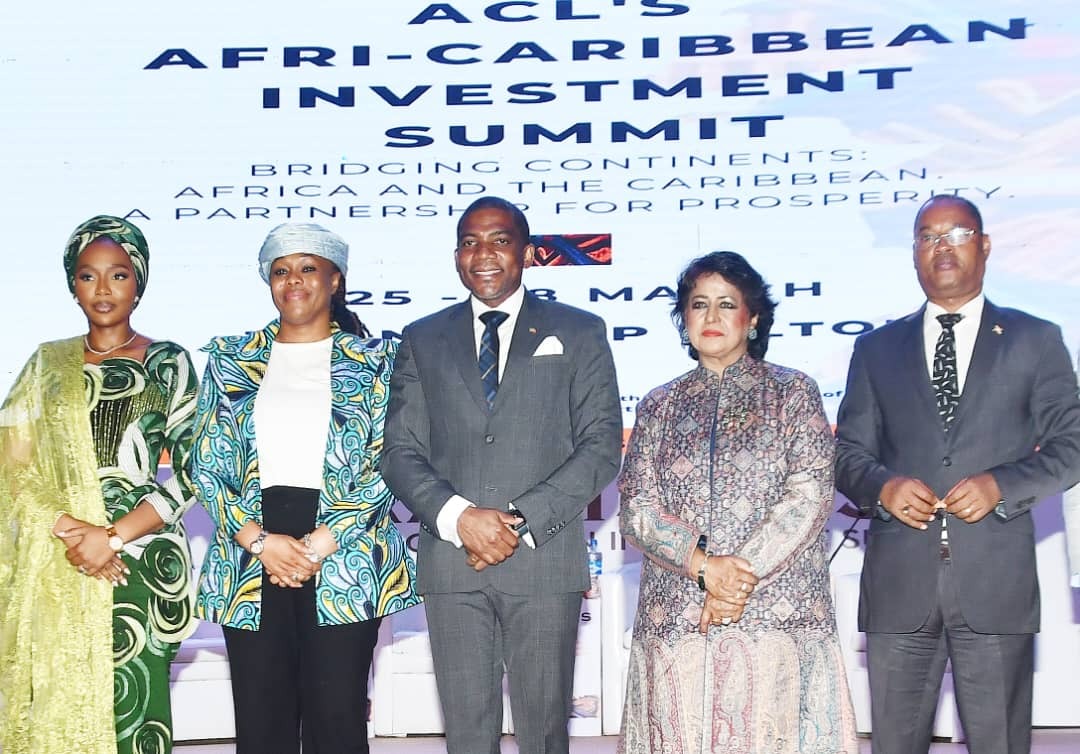The Afro-Caribbean Investment Summit, have marked a significant step in strengthening the ties between the two regions; Africa and the Caribbean, with a focus on sustainability, economic diversification, and collaboration for shared prosperity.
The historical event which took place in Abuja Nigeria, was organised by Aquarian CONSULT, in partnership with the government of Saint Kitts and Nevis, with theme, ‘bridging continents: Africa and the Caribbean, a partnership for prosperity.’
The event brought together political, business, and academic leaders from both Africa and the Caribbean to discuss the potential for deeper economic partnerships and long-term development.
Prime Minister Dr. Terrence Michael Drew of St. Kitts and Nevis while delivering his keynote address highlighted the deep-rooted connection between Africa and the Caribbean.
He described Africa not just as a distant relative to the Caribbean but as the “mother” of the region.
He called for a shift from occasional discussions to a more structured, sustained collaboration in economic, cultural, political, and spiritual areas.
Drew emphasized that both regions must chart a course toward greater cooperation, recognizing their shared stories, challenges, and potential.
He highlighted the importance of addressing climate change, noting that the Caribbean, like many parts of Africa, has already felt the devastating effects of global warming.
Drew presented the geothermal energy project in Nevis as a model for sustainable energy, aiming to reduce the region’s dependency on fossil fuels and promote renewable energy solutions. He proposed that this effort could serve as a model for both African nations and small island developing states across the globe.
“The COVID-19 pandemic exposed the vulnerabilities of global supply chains, especially in the food sector. In response, St. Kitts and Nevis has been investing in modernizing its agricultural systems with a focus on climate-resilient crops and sustainable farming techniques.
“We call on Africa’s agricultural expertise to partner in these efforts, joint research, farm exchanges, and technology partnerships could revolutionize food production for both regions.
“We need reform in our financial systems to support innovation and economic growth. Young entrepreneurs, women, and small businesses often struggle to access the capital needed to bring their ideas to life. It is importance we create innovative financial instruments, such as diaspora bonds and microfinance programs, which could foster economic independence and growth across the Afro-Caribbean bloc.”
Former President of Mauritius, Dr. Ameenah Gurib-Fakim, also emphasized on the structural challenges facing Africa. She noted that while Africa is home to vast natural resources and a growing youthful population, it accounts for a disproportionately small share of global trade and GDP.
Gurib-Fakim highlighted the Africa Continental Free Trade Area (AfCFTA) as a critical step toward creating a unified market that could unlock Africa’s manufacturing potential.
However, she warned that Africa’s economic transformation would only be possible if the continent invests in science and technology and addresses its skills gap in order to meet the demands of the modern economy.
Gurib-Fakim also stressed the importance of education reform to drive innovation and entrepreneurship. She criticized the continent’s educational systems, which she argued “limits the development of critical thinking and problem-solving skills necessary for success in knowledge-based economies.”
For her part, Ms. Aisha Maina, General Managing Director of Aquarian Consult, emphasized the concept of a “Global Africa,” referring to the shared identity and common heritage of people of African descent around the world.
She declared that the time has come for the Global South to invest in itself, reject externally imposed development metrics, and create its own standards for growth.
Maina called for greater collaboration between Africa and the Caribbean, not just in trade but in innovation and entrepreneurship.
She stressed that “both regions must come together, leveraging their collective strengths, to overcome historical divisions and forge a path toward mutual prosperity.”
Also, Prof. Benedict Okechukwu Oramah, President of the Africa Export-Import Bank (Afrexim Bank), reinforced the need for institutionalized cooperation between Africa and the Caribbean.
He highlighted the shared history of colonization and displacement, but also the immense potential for the two regions to collaborate on a global scale.
Oramah emphasized the role of Afreximbank in facilitating trade and investment, urging both regions to harness their natural resources and intellectual capital to build industries that can compete on the global stage.
Oramah concluded by stating that the unity of Africa and the Caribbean could form one of the world’s most powerful political and economic blocs, with the capacity to shape global affairs.
The summit, he said, “was a step toward creating a structured, organized framework for Afro-Caribbean collaboration, with the goal of increasing trade, innovation, and sustainable development.”









